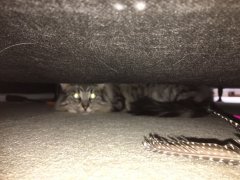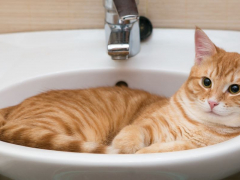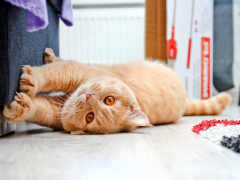
Cats can make all sorts of different sounds, but screaming is one we thankfully don’t hear too often. This can make it even more scary when it does happen!
A cat’s scream is a drawn-out, high-pitched yowling sound that can have several different meanings. Cats might scream due to pain or fear, as a warning to stay away, during mating, or sometimes if they have certain medical conditions like dementia or hyperthyroidism. If your cat is screaming and you can't figure out the reason, schedule an appointment with your veterinarian to have your cat checked out.Key Takeaways
Sometimes, cats scream due to pain or fear, and sometimes there are less concerning reasons for screaming in cats. We’ll cover whether you need to rush your screaming cat to the vet, and what the possible causes could be.
Different Sounds Cats Make
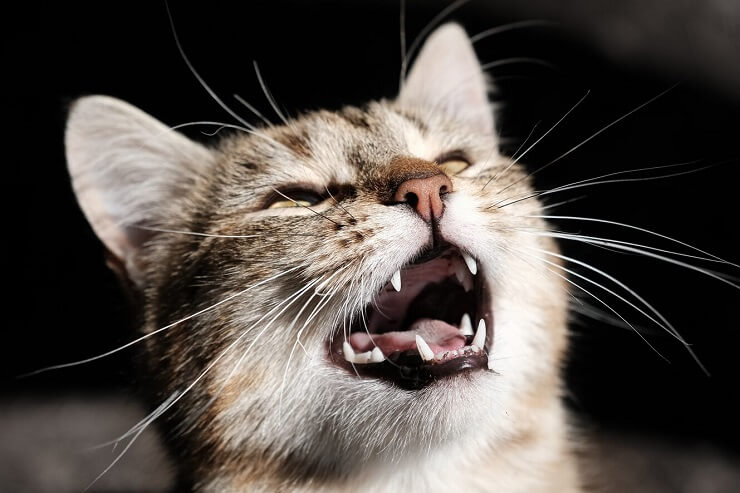
Although any toddler can tell you that “cats say meow,” cat lovers everywhere will quickly tell you that’s not all they do. While cat meowing is a common noise cats make when communicating with humans, they’re also capable of making a number of different sounds.
When a cat is scared, their sounds include hissing, spitting, and growling. Purring and humming are generally sounds of contentment, while chirping, trilling, and chattering are sounds of excitement. Some cats are known to be more “chatty” than others—Siamese cats are a breed known for their vocalizations.
A cat’s scream doesn’t sound like a human scream, but it’s clearly a scream. It’s a drawn-out, high-pitched yowling sound that has several different meanings, which we’ll cover in more detail below.
Also Read: Why Does Your Cat Yowl At Night & How Do You Get Them To Stop?
What Does It Mean When A Cat Is Screaming?
If your cat is screaming, you’ll know what I mean when I say it’s a terrible noise. There are a number of common reasons why your cat could be screaming, and you’ll need to pay attention to their behavior and body language to work out what’s wrong.
1. A Warning
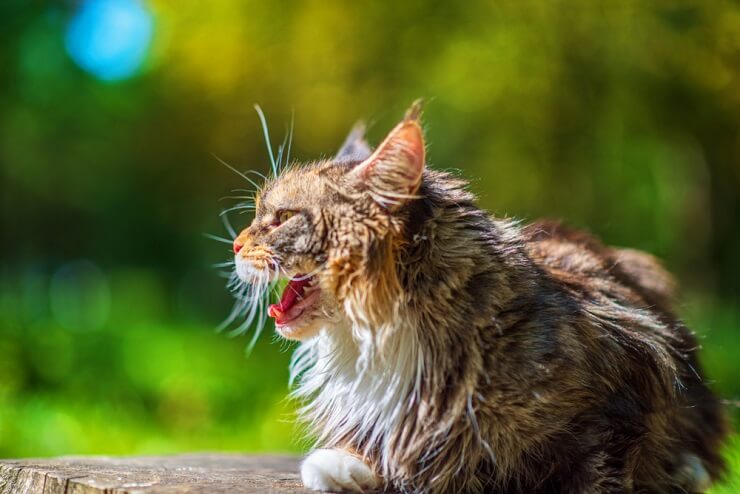
A scared cat might scream as a warning not to come any closer.
Probably the most common cause of a cat screaming is when a scared cat screams as a warning. Your cat is saying “don’t do that,” “don’t come close,” or “I’m likely to bite if you move.” This warning is useful.
Cat fights can be devastating for cats, resulting in injuries that take months to heal or, in the wild, become fatal. Cats want to avoid physically fighting at all costs. This scream serves as a last warning before the attack.
You can tell if your cat is screaming because they’re scared as their body language will be a dead giveaway—an arched back, flattened ears, lowered body, and tension are all signs that your cat is giving a warning.
Also Read: Why Does My Cat Bite Me When I Pet Her?
2. Pain
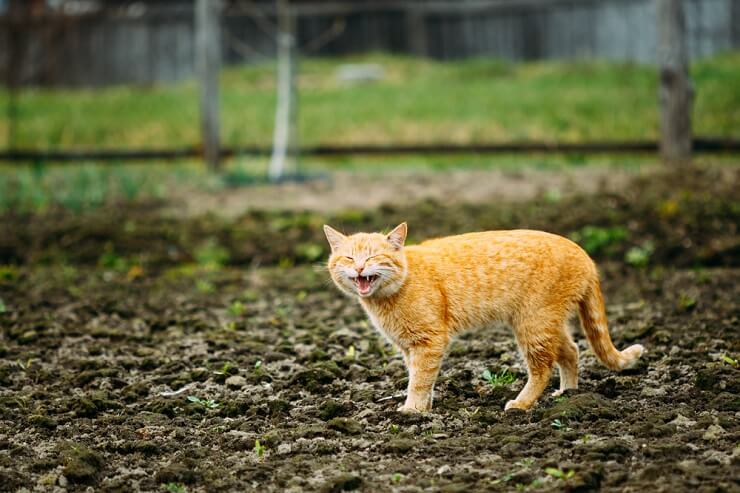
If an injured cat is screaming in pain, it’s very serious and the cat requires immediate veterinary treatment.
One possible reason why cats may scream is due to pain. If your cat comes in screaming or appears to be injured, you’ll need to take them to the veterinarian right away. Many injuries are severe enough to cause cats to scream.
Possibilities include a collision with a car or an aortic thromboembolism, both of which are emergencies. If your male cat is screaming while using the litter box, this is also an emergency as it could be a sign of a urinary blockage, which can be deadly.
Also Read: Cat Back Legs Collapsing: Causes, Symptoms, & Treatment
3. Looking For A Mate Or Mating
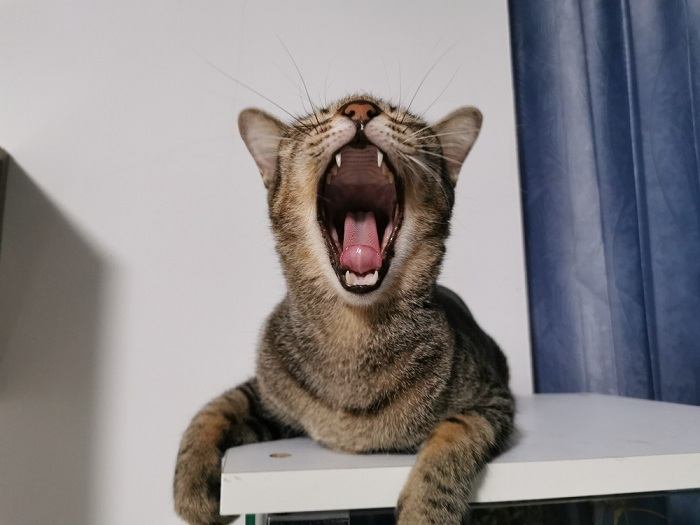
Cats that are not spayed or neutered might scream as part of mating behavior.
Non-sterilized (entire) cats, both male and females, might scream when looking for a mate. Cats can also scream when mating. This is known as caterwauling!
If your young female cat has started screaming for the first time and she is not spayed, she’s probably in season. You’ll need to schedule an appointment for spaying to prevent unwanted litters.
Also Read: Why Do Cats Meow Before They Use The Litter Box?
4. Confusion

Confused cats may make excessive meowing sounds. This is often the case if a cat has dementia (cognitive dysfunction), hyperthyroidism, or high blood pressure, all of which can cause cats to start yowling. These are more common in older cats, so if your senior cat starts screaming it’s definitely worth taking them to the vet.
Also Read: The 7 Best Litter Boxes For Senior Cats
Why Do Cats Scream At Night?
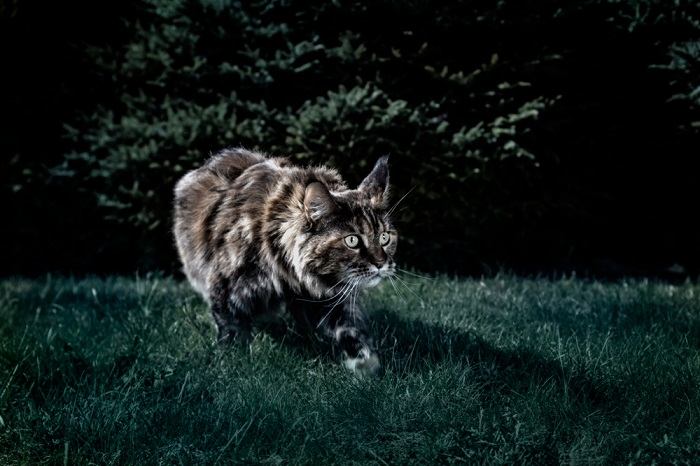
Cats that are outdoors roaming at night might scream when hunting, fighting, or mating.
Cats tend to scream at night because they’re crepuscular, meaning they’re most active at dawn and dusk. This means that, for outdoor cats, dawn and dusk are the times they’re most likely to be roaming outside, hunting, fighting, and mating—so there are lots of opportunities for those middle of the night screams to disturb your sleep!
For older, indoor cats, screaming at night may be a sign of night blindness, separation anxiety, or confusion related to dementia.
Also Read: How Do Cats Hunt?
What To Do If A Cat Is Screaming?

If your cat is screaming and you don’t know the reason, it’s important to visit the veterinarian for a checkup.
If your cat is screaming, you’ll need to work out the cause to decide whether to take her to the veterinarian or not. If your previously older cat has started screaming, and you can’t figure out a cause, it’s best to schedule an appointment with your veterinarian to check for medical problems like an overactive thyroid (hyperthyroidism) or cognitive dysfunction (feline dementia).
If there are other symptoms of a problem, such as dragging a limb, panting, or injury, you should call the nearest open veterinary hospital immediately.
If your cat hasn’t been spayed and is now screaming, it’s likely she’s in season and is looking for a mate. She will be an escape artist—be extremely careful not to let her out and not to let any male cats near her or you will soon end up with a pregnant cat. It’s best to schedule a spay appointment as soon as possible to ensure you don’t get any unwanted litters.
If your cat is screaming as a warning, stop what you’re doing and try to diffuse the situation. A screaming cat is extremely likely to lash out, so make no sudden movements and try to back away. If your cat does lash out it’s important to treat all wounds seriously, as cat bites usually get infected and will need antibiotics.
If another animal is causing the scream, try to get them out of danger. You might be able to call a dog away or open a door to give one of the animals an escape route. You’ll also need to prevent your cat from feeling this threatened in the future. This might mean talking to a cat behaviorist to help you find the cause of your cat’s fear.
If you can’t see a reason for the excessive vocalization, it’s best to head to a vet for a checkup. It’s probably nothing to worry about, but cats are masters at hiding how they really feel, and you wouldn’t want to miss something serious.
Also Read: The 10 Things That Cats Hate Most
Final Thoughts

There are a number of cat noises that cat owners should be aware of, and screaming is an important one. Cats might scream due to pain, fear, or confusion, as well as during mating or as a warning. If your previously healthy cat has suddenly started screaming it’s sensible to get them in to see a veterinarian, especially if they have other symptoms.
Also Read: 8 Ways To Help a Scared and Fearful Cat Be Confident
Frequently Asked Questions
Why is my cat yowling so much?
There are lots of reasons your cat might be yowling, including pain or fear, as a warning, due to confusion, or because they’re looking for a mate. If you aren’t sure which of these applies to your cat, it’s best to schedule an appointment with your veterinarian.
Do cats scream when in pain?
Cats sometimes scream when in severe pain, such as after a road traffic collision or because of an aortic thromboembolism. However, if your cat isn’t screaming that doesn’t mean they aren’t painful—sometimes cats will be completely silent despite severe pain.
What does a cat sound like in pain?
Some cats will cry or scream when in pain. However, in most cases a cat in pain will be silent. As a prey animal, they prefer not to let anybody know they’re painful. Don’t assume that because your cat isn’t crying, they aren’t sore—everything from arthritis to urine infections to dental pain can be severely painful even if your cat isn’t screaming.

